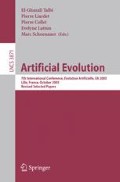Abstract
The automated design of systems which self-assemble is a fundamental cornerstone of nanotechnology. In this paper we review some work in which we have applied Evolutionary Algorithms (EAs) for the automated design of systems self-assembly. We will focus in three important minimalist self-assembly problems and we discuss the difficulties encountered while applying EAs to these test cases. We also suggest some promising lines of work that could possibly help overcome current limitations in the evolutionary design of self-assembling systems.
Access this chapter
Tax calculation will be finalised at checkout
Purchases are for personal use only
Preview
Unable to display preview. Download preview PDF.
References
Adleman, L., Cheng, Q., Goel, A., Huang, M., Kempe, D., Espanes, P.M.d., Rothemund, P.W.K.: Combinatorial optimization problems in self-assembly. In: Proceedings of the Annual ACM Symposium on Theory of Computing (STOC), ACM Press, New York (2002)
Bedau, M.A., Packard, N.H.: Measurement of evolutionary activity, teleology and life. In: Langton, C.G., Taylor, C., Farmer, D., Rasmussen, S. (eds.) Artificial Life II, vol. 98-03-023, pp. 431–461. Addison-Wesley, Reading (1992)
Berger, B., Leight, T.: Protein folding in the hydrophobic-hydrophilic (HP) model is NP-complete. In: Proceedings of The Second Annual International Conference on Computational Molecular Biology, RECOMB 1998, pp. 30–39. ACM Press, New York (1998)
Dill, K.A.: Theory for the folding and stability of globular proteins. Biochemistry 24, 1501 (1985)
Escuela, G., Ochoa, G., Krasnogor, N.: Evolving l-systems to capture protein structure native conformations. In: Keijzer, M., Tettamanzi, A.G.B., Collet, P., van Hemert, J.I., Tomassini, M. (eds.) EuroGP 2005. LNCS, vol. 3447, Springer, Heidelberg (2005)
Glover, F., Taillard, E., de Werra, D.: A user’s guide to tabu search. Annals of Operations Research 41, 3–28 (1993)
Kirkpatrick, S., Gelatt, C.D., Vecchi, M.P.: Optimization by simulated annealing. Science 220(4598), 671–680 (1983)
Klavins, E.: Automatic synthesis of controllers for distributed assembly and formation forming. In: Proceedings of the IEEE Conference on Robotics and Automation (2002)
Krasnogor, N., Gustafson, S.: A family of conceptual problems in the automated design of self-assembly. In: Proceedings of the 2nd International Conference on the Fundations of Nanoscience: Self-Assembled Architecture and Devices, Utah, Snowbird resort, April 24-29 (2005)
Krasnogor, N., Pelta, D.A., Marcos, D.H., Risi, W.A.: Protein structure prediction as a complex adaptive system. In: Proceedings of Frontiers in Evolutionary Algorithms 1998 (1998)
Collet, P., Lutton, E., Raynal, F., Schoenauer, M.: Polar ifs + parisian genetic programming = efficient ifs inverse problem solving. Genetic Programming and Evolvable Machines 1, 339–361 (2000)
Reinelt, G.: Tsplib, http://www.iwr.uni-heidelberg.de/iwr/comopt/soft/tsplib95/tsplib.html , mirror site: gopher: http://softlib.rice.edu/11/softlib/tsplib
Rothemund, P., Winfree, E.: The program-size complexity of self-assembled squares. In: Proceedings of STOC (2000)
Wang, H.: Probing theorems by pattern recognition. Bell Systems Technical Journal 40, 1–42 (1961)
Krasnogor, N., Hart, W.E., Smith, J.E.: Recent Advances in Memetic Algorithms. In: Studies in Fuzziness and Soft Computing Series, Springer, Heidelberg (2004)
Whiteside, G.M., Boncheva, M.: Beyond molecules: Self-assembly of mesoscopic and macroscopic components. Proceedings of the National Academy of Science (PNAS) 99(8), 4769–4774 (2002)
Whiteside, G.M., Grzybowski, B.: Self-assembly at all scales. Science 295, 2418–2421 (2002)
Wolfram, S.: A New Kind of Science. Wolfram Media Inc. (2002)
Author information
Authors and Affiliations
Editor information
Editors and Affiliations
Rights and permissions
Copyright information
© 2006 Springer-Verlag Berlin Heidelberg
About this paper
Cite this paper
Krasnogor, N., Terrazas, G., Pelta, D.A., Ochoa, G. (2006). A Critical View of the Evolutionary Design of Self-assembling Systems. In: Talbi, EG., Liardet, P., Collet, P., Lutton, E., Schoenauer, M. (eds) Artificial Evolution. EA 2005. Lecture Notes in Computer Science, vol 3871. Springer, Berlin, Heidelberg. https://doi.org/10.1007/11740698_16
Download citation
DOI: https://doi.org/10.1007/11740698_16
Publisher Name: Springer, Berlin, Heidelberg
Print ISBN: 978-3-540-33589-4
Online ISBN: 978-3-540-33590-0
eBook Packages: Computer ScienceComputer Science (R0)

